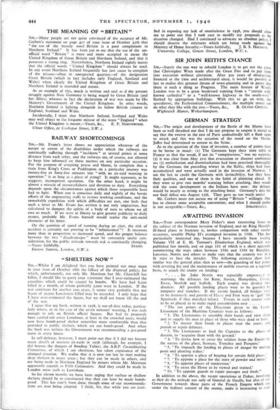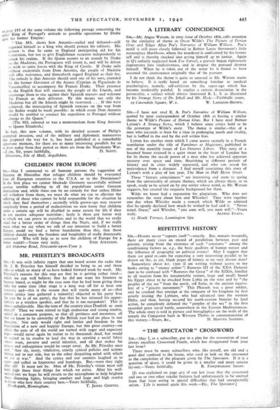AWAITING INVASION
Six,—Your correspondent Mary Fisher's most interesting letter on the subject of the Norman invasion of England, and on King Harold's ill-fated plans to frustrate it, invites comparison with other similar occasions, notably Philip II's attempted invasion in 1588. This has particularly interested me, because I have recently been reading Volume VII of E. M. Tenison's Elizabethan England, which was published last month, and on page 181 of which is a short appendix summarising the steps taken between 1586 and 1588 by Burghley. Leicester, Norris and others to make sure that the country was in a fit state to face the invader. The following extracts show hcm similar was the general plan then as now—the guarding of key points with covering fire and the maintenance of mobile reserves on a regional basis, to attack the enemy on landing: " . . . Sir John Norris was especially empowered to rearrange the defences for Kent, Sussex, Hampshire, Dorset, Essex, Norfolk and Suffolk. Each county was divided into districts. All possible landing places were to be guarded by ramparts and trenches. If the enemy landed, all bridges were to be destroyed; and patrols of Horse and Foot were to gall ' the Spaniards if they marched inland. Troops in each county were to be so placed as to make rapid concentration easy . . . .
" The ten points of the Directions given to the Lords- Lieutenant of the Maritime Counties were as follows: 1. The Lieutenants to assemble their bands and view them and to supply the men in place of those who were dead or lame.
" 2. To muster their bands in places near the coast; and punish or repair defences. " 3. The Lieutenants to lead the Captains to the places of descent, to acquaint them with the ground.'
" 4. To devise how to cover the soldiers from the Enemy by the nature of the place, Sconces, Trenches and Parapets.'
" 5.' To impeach the .landing in places of danger by making posts and planting stakes.'
" 6. To appoint a place of keeping for certain field pieces.'
" 7. ' To appoint a place for the store of powder and metal.'
" 8. To appoint places of rendezvous.'
" 9. To cause the Horse to be viewed and trained.'
" 10. To appoint guards to repair passages and fords."
In addition to the above, the recent operations at Dakar, involving es they do the attitude not only of General de Gaulle, but also of our Government towards those parts of the French Empire which are under the indirect control of the enemy, make it interesting to read on page 193 of the same volume the following passage concerning the exited King of Portugal's attitude to possible operations by Drake upon his former Empire:
" This MS. shows how Antonio—exiled and defeated—still regarded himself as a king who should protect his subjects. His protest ' is that he came to England anticipating aid for his restoration, but not to give Englishmen occasion independently to attack his realms. If the Queen assents to an assault by Drake on the Madeiras, the Portuguese will resent it, and will be driven to wish to unite forces with the King of Castile. If Drake sails without credentials from Dom Antonio, the people of Madeira kill offer resistance, and thenceforth regard England as their foe. The remedy is that Antonio should send one of his sons, attended by the former Governor of the Azores (Cyprian de Figueiredo de Vasconcellos) to accompany Sir Francis Drake. Their presence in the English fleet will reassure the people of the Islands, and encourage them to rise against their Spanish masters and welcome Sir Francis as their deliverer. By this means not only the Madeiras but all the Islands might be recovered. . . . If this were achieved, the intercepting of Spanish treasure on the way from the Indies would be made possible: in which event Dom Antonio would be enabled to conduct his expedition to Portugal without charge to the Queen."
(The MS. referred to was a memorandum from King Antonio to Queen Elizabeth.) In fact, this new volume, with its detailed account of Philip's attempted invasion, and of the military and diplomatic manoeuvres that prepared the way for it, has been published at a remarkably opportune moment, for there are as many interesting parallels for us to draw today from that period as there are from the Napoleonic War.
—I am, Sir, yours faithfully, D. Scan. Glencross, Isle of Mull, Argyllshire.







































 Previous page
Previous page